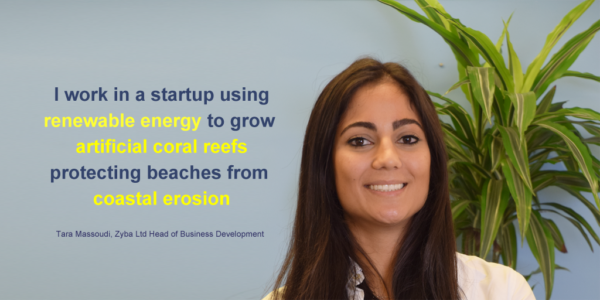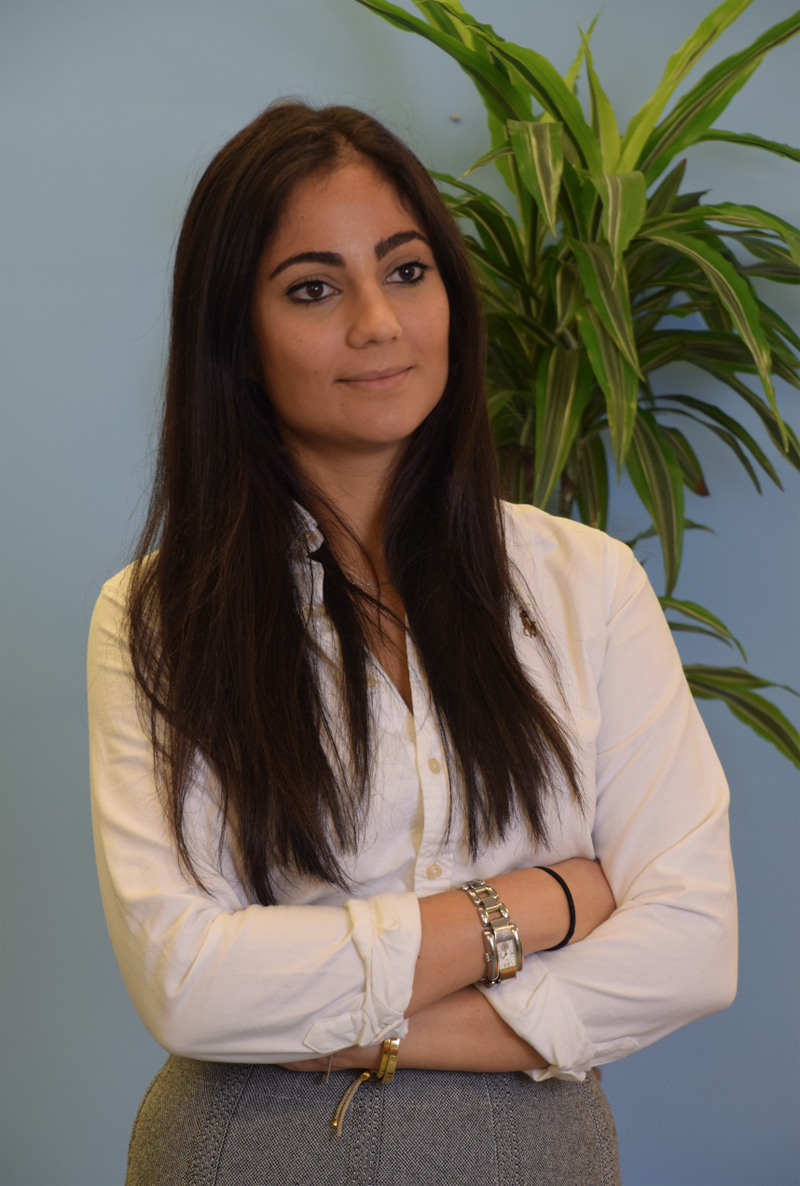Tara Massoudi’s graduate engineering background took her into a whole different world of sustainability careers in a tech start up where she gets to make business decisions that could help protect coasts worldwide from climate change.
Tara Massoudi is head of business development at Zyba Ltd, which has developed CCell, a technology that uses wave energy to create artificial coral reefs. This can provide a long-term, ecological solution to coastal erosion, restoring fisheries and enhancing tourism. The world is shifting to clean growth, and that is why it is at the core of the Government’s modern Industrial Strategy. This is supported by the Government’s move to make the UK the first major economy to pass laws to end its contribution to global warming by 2050.
“I became head of business development so I could…”
Use my problem solving skills to set strategy and shape the direction of our business.
What was your career journey like?
My career journey hasn’t been straightforward; I’ve gone from technical engineering to a commercial role in a tech startup.
I started off as a graduate engineer, solving exciting technical challenges in the offshore oil and gas industry. I worked on one of the UK’s largest natural gas projects, managing the structural design and construction team for offshore commissioning and installation.
I was interested in getting involved in renewable energy, so I joined a startup focused on developing a solution to harness energy from ocean waves, called CCell. Here, I wanted to make a big impact, so I started to gravitate towards commercialisation and business development, which allowed me to support the direction of the company, working together with CEO.
What qualifications do you need to get a business role in a tech startup? Do you need a degree?
For this type of commercial role, traditionally you may get a business or economics degree. Technical degrees like engineering give a different perspective that can add a great deal of value.
I have a master’s degree in civil and environmental engineering from University College London. I believe engineering instils a certain way of thinking, giving you the skills needed to approach different problems, whether they are technical or commercial.
Were there any ways in which you think your CV stood out from the crowd to get the role?
Having a technical engineering background ensures employers know you have an analytical mindset. This is valuable in most roles, from technical jobs to consulting, through to finance and business development.
The choice of university can be a big differentiator for employers, especially early on in your career, together with the grade you achieve.
Overall, it’s about the path you take and the story you tell. But you have to get through the initial screening before you get to explain that in an interview. Build up your CV with strong subjects, good work experience (internships or full-time jobs), skills (programming etc.) and also extra-curricular activities – what do you do outside of work/school?
What kind of things does your job involve?
I work in a startup that uses renewable energy (wave and solar) to grow artificial coral reefs that protect beaches from coastal erosion. We are on a mission to transform the coastal protection industry, drawing on nature to provide a long-term, beautiful solution that enriches ecosystems.
I work along with the CEO to shape the commercial direction of the business. This involves identifying new markets where our solution is useful (e.g. Mexico, Dominican Republic and Indonesia) and working (hard) to get the product to them. In the last year I’ve set up a local management and sales team in Mexico, established key relationships with the government and secured a project with them to provide a demonstration of what we can do and why it’s amazing. This is all so that we can get customers in Mexico to implement our solution. This model is then replicated in different regions as we grow.
What are the perks?
My favourite part of what I do is being able to solve new and exciting problems every day.
Other perks are:
- Travelling to interesting places and meeting people from all over the world
- Having a lot of responsibility to shape the strategy for business development and implementation
- Being part of a passionate team, working to implement the solution.
What does a typical working day look like? Start with breakfast!
My working days can be very different. They can involve nerve-wracking pitches or conferences where I promote what we do, meeting with investors or with customers, or it can be me at my desk in our office in London.
When I’m in the office, a typical day will involve me coming in, having a cup of coffee and going through missed emails. I always have ‘To do’ lists, which I follow religiously to get tasks done. I tend to work on things like investor material and marketing material.
In the evenings the team and I will try and have a quick catchup with the team in Mexico, before we head home for the day.
We have a relaxed work environment where people are encouraged to challenge business as usual.
The bigger picture – why is business development an important career choice?
Within the startup, my role holds a lot of responsibility. I basically support the CEO with most business activities.
Business development is generally extremely important, though, because it is the function that deals with generating new business (getting customers). Without customers, the business will not be able to operate.
Business development managers are responsible for growing the customer base efficiently, which is critical for a healthy company. In our case, it’s about getting a product or service to the right market, to generate revenue for the business.
Why should young people think about getting into engineering, business or sustainability careers?
Our business spans a range of industries. In CCell, we focus predominantly on coastal protection, renewable energy and ocean conservation. We aim to reduce CO2 emissions by using more renewables, whilst helping coastal communities adapt to climate change with long-term sea defences that also offset the damage to marine ecosystems by creating new coral reefs.
With the looming threats of global warming and climate change, it’s crucial for more and more people to get involved in developing and implementing effective solutions.
We need engineers, scientists, economists and decision makers within the private and public sectors to come together and work towards a mutual goal.
It is only by combining a range of solutions that we can truly tackle these global challenges, so we need more people to get involved!
See more: Modern Industrial Strategy – Clean Growth Grand Challenge














